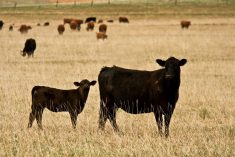A boulder falling off a mountain accelerates and gains momentum as it nears the ground. Until we see another force come into play, there’s no signal the lows are near in the feeder complex.
Once again, the western Canadian feeder cattle traded $8 to $10 below week-ago levels, with sharper declines noted on unweaned calves. Feedlot equity erosion over the past year has shifted the demand beyond comprehension. Alberta fed cattle traded in the range of $128-$131 this past week, approximately $15 below breakeven closeouts.
Bright spots were few and far between with medium-flesh mixed steers averaging 900 lbs. selling for $160 in central Alberta while Angus-based larger-frame black steers weighing just over 800 lbs. quoted at $170. Feedlot operators were factoring in the potential for stronger feed grain prices now that the harvest period is likely over. Approximately 25 per cent of the wheat and barley crops remain in the field and this could all of a sudden be another wrench in the equation.
Read Also

U.S. grains: Soy futures post biggest monthly gain in nearly five years on China trade optimism
U.S. soybean futures climbed to a 15-month high and posted their biggest monthly gain in nearly five years on Friday following a rally fueled by the prospect of revived exports to China.
In the latter half of the week, the feeder market heavily succumbed to spillover pressure from the live cattle futures. To put the market in perspective, the June 2017 contract is within $14 of the 2009 recession lows. Calf prices tended to free-fall at times with 550-lb. steers readily averaging from $175 to $181 across the Prairies. But in minor markets such as northern Alberta, higher-quality larger-frame fancier calves around 550 lbs. were as low as $163. Heifers hovering at 550 lbs. were spotted at $160 landed in southern Alberta, but this was a feature area. It was not uncommon to see values $10 lower outside Feedlot Alley and unweaned bawlers dipped as much as $15 off the average quoted prices.
Adverse weather plagued Western Canada and buyers incorporated a risk discount, especially in the non-major feeding regions of Saskatchewan and Manitoba. Many calf producers have delayed cattle sales this fall so the market has larger volumes to digest over the next month. Heifers that were originally going to be held back are coming onstream and the industry is looking to see if the cow slaughter picks up over the winter.
— Jerry Klassen is manager of the Canadian office for Swiss-based grain trader GAP SA Grains and Produits. He is also president and founder of Resilient Capital, which specializes in proprietary commodity futures trading and commodity market analysis. Jerry owns farmland in Manitoba and Saskatchewan but grew up on a mixed farm/feedlot operation in southern Alberta, which keeps him close to the grassroots level of grain and cattle production. Jerry is a graduate of the University of Alberta. He can be reached at 204-504-8339.













